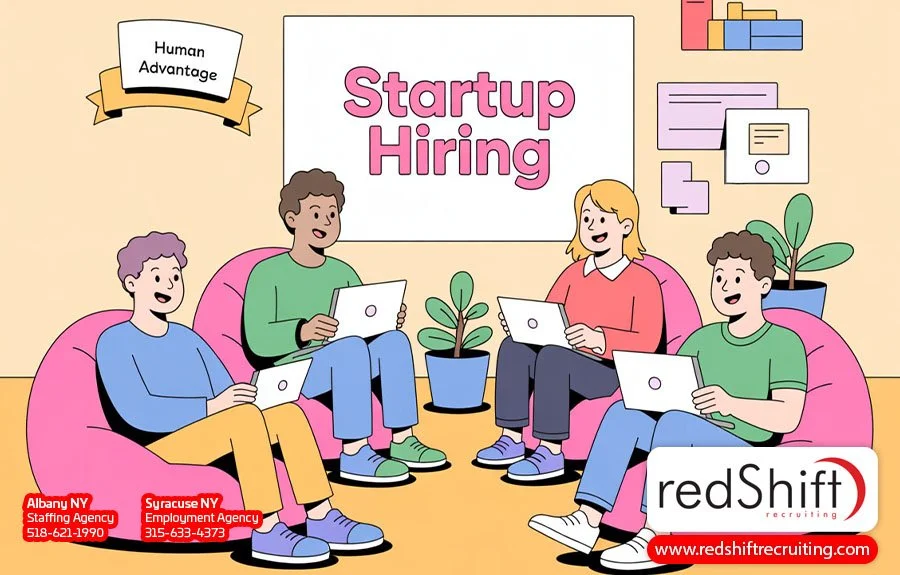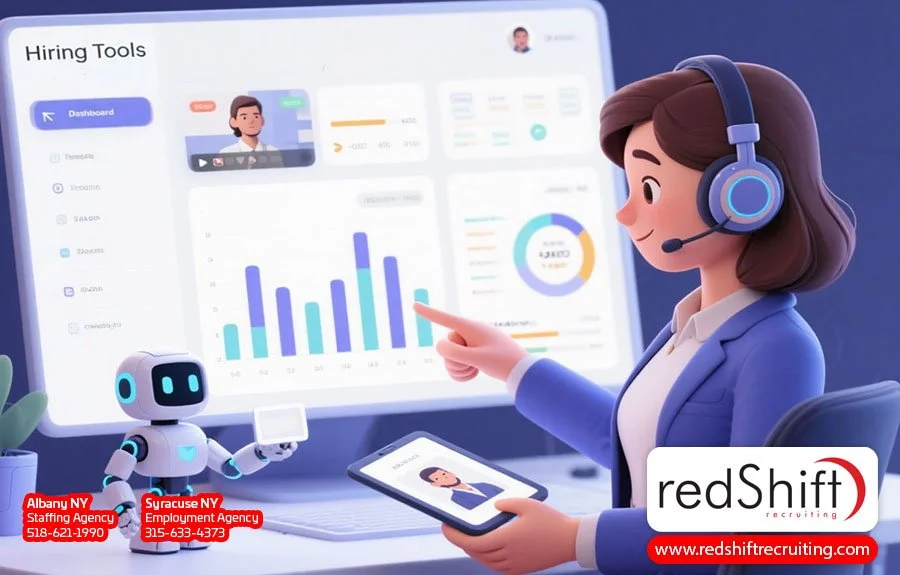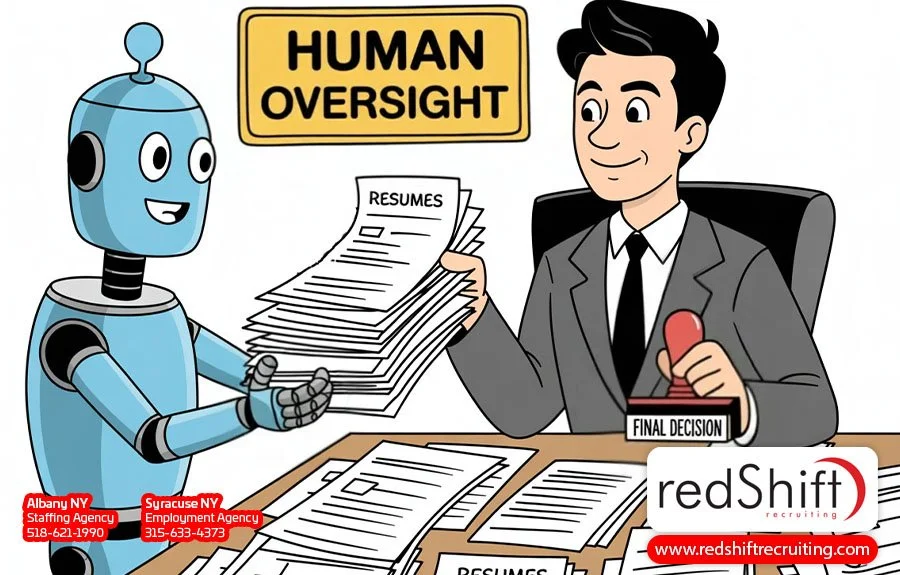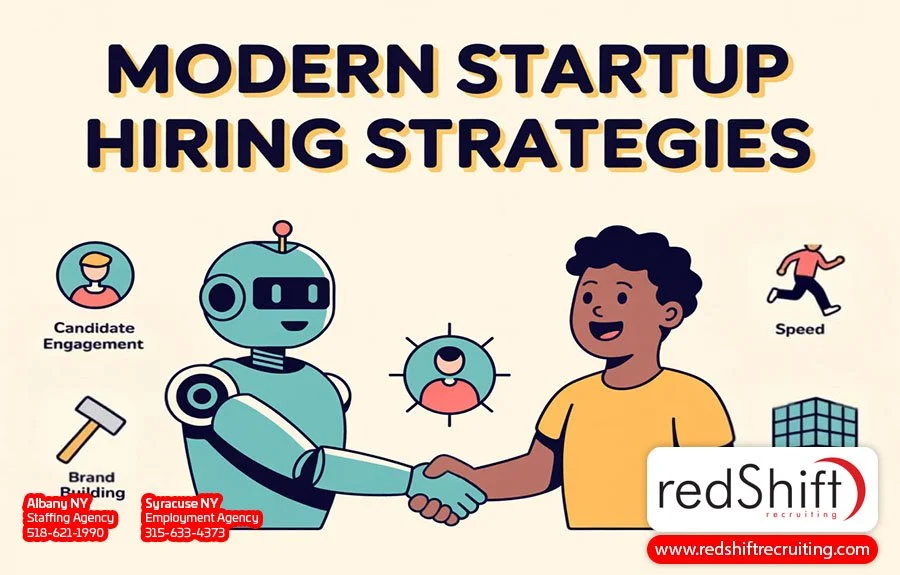Modern Startup Hiring Strategies: Competing for Talent with AI and Human Insight
Hiring has changed—and so has the competition. Today's startups aren’t just up against established companies with large hiring budgets. They’re competing with automated screening systems, algorithm-driven job boards, and candidates with higher expectations than ever.
But this evolving job market also creates new opportunities. While large companies may have more budget, reach, and brand recognition, startups have something else: adaptability, authenticity, and the ability to connect with candidates on a more personal level. Those that move quickly, use the right tools, and communicate their value clearly can stand out.
This guide shares modern startup hiring strategies that blend smart technology, ethical practices, and real human insight, helping founders and hiring managers attract top talent without losing what makes their company unique. From using AI responsibly to delivering a better candidate experience, we’ll break down the tools, tactics, and mindset that give startups a competitive edge in today's talent market.
The Startup Challenge: Big Competition, Small Margins
Startups operate in a competitive market, often going head-to-head with large, established companies that boast bigger budgets, stronger brand recognition, and full-scale HR departments. For early-stage startups, that means trying to attract skilled candidates with limited resources—and doing it before someone else does.
But today’s startups and small businesses face more than just budget constraints in a talent market shaped by digital saturation and algorithmic bias. Platforms like LinkedIn, Dribbble, and traditional job boards often favor larger brands with longer posting histories and deeper ad spend—an algorithmic preference that makes it difficult for a smaller company’s listings to gain organic visibility with the right candidate pool. Without brand recognition or a strong digital presence, even the most compelling job descriptions can get buried and overlooked.
Meanwhile, hiring managers are navigating a landscape of rising candidate expectations: faster response times, more personalized communication, and transparency around compensation, growth, and values. With concerns about job scams and ghost listings on the rise, startups must also prove their legitimacy early, and that starts with a hiring process that feels clear, responsive, and real.
Because an effective hiring strategy isn’t just about attracting enough qualified candidates— it’s about making sure the right ones understand what makes your opportunity worth pursuing. The journey to startup success starts with building a team of people who believe in your mission and want to help shape it.
The good news is you don’t need corporate perks or global brand power to attract talent. The winners in this market aren’t always the highest spenders; they’re the ones who hire smarter, communicate better, and move faster.
Smarter Recruiting Technology Levels the Field
When effective talent acquisition strategies demand both speed and scale, startups can gain real ground by using recruiting tools that make their hiring process more efficient and more candidate-friendly. The right tech doesn’t just save time; it helps smaller teams compete with larger employers that rely on brand visibility and volume.
Today’s platforms offer a range of solutions to help identify and engage qualified candidates faster. For example, AI-powered sourcing tools like Fetcher and HireEZ can scan networks and platforms to find individuals with specific technical skills, reducing time spent filtering irrelevant resumes. You’ll also find platforms like Gem and LinkedIn Recruiter offering advanced filtering, engagement tracking, and campaign automation to help teams target passive talent and monitor outreach. Others, such as SeekOut or Entelo, provide access to curated talent pools, diversity filters, and enriched candidate data, making it easier to expand your reach beyond immediate networks.
To improve personalized engagement, startups can use automated scheduling, email sequences, and CRMs to create a better candidate experience, even with small teams. Candidates today expect tailored, timely outreach and a clear sense of what to expect next in the process, not just vague, automated emails. Using tech to enhance relevance and responsiveness helps build trust and strengthens your employer brand, even with candidates you don’t hire.
Meanwhile, assessment tools can help evaluate both soft skills and technical capabilities, giving hiring teams a clearer, more objective view of candidate fit early in the process. In addition to supporting skills-based hiring by focusing on demonstrated competencies over degrees, effective skills tests can reduce bias by creating more consistent evaluation criteria and identifying candidates who might otherwise be overlooked. With the right implementation, data-driven screening doesn’t just speed things up—it helps level the playing field. And when combined with a good applicant tracking system, these tools streamline workflows, reduce manual tasks, and shorten the time from outreach to offer, eliminating slow hiring processes that drive top candidates away.
Using Automation Responsibly
Of course, with automation comes responsibility. Efficiency is valuable, but trust and fairness matter just as much. Here’s a quick checklist to ensure your use of AI in hiring remains ethical and effective:
Be transparent about how tools screen or rank candidates.
Regularly audit your algorithms and workflows for potential bias.
Keep final decisions—especially hiring or rejection—in human hands.
Use your own network to validate talent and referrals, not just machine matches.
Remember that every tech touchpoint is still a human experience.
These tools are powerful, but they’re not magic. When used responsibly, recruiting tech doesn’t replace good judgment. It amplifies it. While AI and automation can help expand reach beyond traditional job boards, they work best when paired with tried-and-true strategies like an updated careers page and targeted job postings that speak clearly to your company’s mission and culture. The smartest approach isn’t about full automation—it’s about designing systems that support faster, fairer, and more thoughtful decisions.
The Human Advantage: What Startups Offer That Tech Can’t Replicate
AI and automation can help small businesses compete with big tech for talent, but with more and more companies adopting these new tools, standing out now depends on how well you combine technology with authenticity. Startups can gain an edge by offering what tech can’t replicate: human connection, purpose, and flexibility.
Authentic Company Culture: Candidates want to understand not just the perks, but the people. Startups that communicate their core values, team structure, and work style (beyond buzzwords) are more likely to attract the right talent for their business. A clearly defined company culture creates early trust and long-term engagement.
Faster, More Agile Hiring: Unlike large companies restricted by slow, traditional hiring processes, startup teams can move quickly, personalize communication, and adapt to a candidate’s pace. That agility shows respect for the candidate’s time and keeps momentum strong so top-tier talent doesn’t move on before you make an offer.
Mission That Matters: Small businesses with a clear “why” resonate deeply with startup talent looking for impact. Tying roles directly to the company’s purpose helps attract those who want to demonstrate initiative and make a visible difference—not just fill a role, but help shape the company itself.
Creative Role Design: Whether it’s shaping responsibilities around a candidate’s specialized skills or evolving a position over time, startups can often offer flexibility that larger organizations can’t. This kind of creative freedom is especially appealing in hybrid or emerging roles.
Openness to Diverse Perspectives: With lean, cross-functional teams, startups often hire for curiosity, adaptability, and values alignment rather than pedigree. This supports more positive team dynamics, creates space for diverse perspectives, builds stronger company values, and encourages teams to grow in new directions together.
Meaningful Trade-Offs: While early-stage startups may not offer the full suite of traditional employee benefits, many candidates value what they get in return: more visibility into leadership, faster decision-making, and real input into company direction. Flexibility for remote employees and involvement in policy-shaping can make the package more attractive as well.
A Global, Inclusive Outlook: For many growing tech companies, hiring globally isn’t just practical—it’s part of their culture. Building a geographically distributed team shows that you value inclusion, adaptability, and a broader worldview, which can strengthen internal collaboration and external brand perception.
Ultimately, what makes a successful startup isn’t just funding or product-market fit; it’s the team behind it. And in today’s tech-saturated hiring market, authenticity and responsiveness are still your most effective recruiting tools.
Retention Through Trust and Transparency
Startups can’t afford high turnover, and the best way to prevent it is to start building trust from the very first interaction. Here’s how smart hiring leads to long-term retention:
Set Clear Expectations Early: When candidates understand what the role actually involves, including the workload, challenges, goals, and support available, they’re more likely to stay. That begins with a job description that reflects the reality of the role. Open conversations during the hiring process help set clear performance expectations, reduce early-stage disillusionment, and give new hires a stronger sense of ownership.
Transparency Builds Loyalty: Whether you're using AI tools or traditional screening methods, clarity around how decisions are made and how candidates are evaluated earns trust. That trust often carries into the workplace, where it becomes the foundation for stronger company culture, accountability, and team morale. When new employees see follow-through on promises made during hiring, it reinforces your company stand on integrity and fairness.
Engagement Starts Before Day One: The best onboarding begins before the offer is signed. Personalized communication, timely updates, and respectful treatment during the hiring process set the tone for how people expect to be treated as employees. This approach creates a smoother ramp-up and reduces the adjustment period for new team members—a key component of effective startup hiring.
Retention Is a Human Strategy: Startups that prioritize people, not just performance, build more resilient teams. When employees receive regular feedback, flexibility, and the chance to grow, they’re more likely to stay, even when larger offers come along. These investments in your people not only lead to sustainable growth and a high-performing team, but they also lay the foundation for your company’s future success in a competitive hiring market.
Culture Is Built in the Details: In fast-paced startup environments, retention isn’t just about perks or pay; it’s about whether people feel heard, supported, and aligned with the mission. The little things matter: consistent communication, clear role evolution, and shared values help turn good teams into great ones.
Ultimately the most effective hiring strategies don’t stop at the offer. They set the stage for people to stay and succeed.
Recruiters as Strategic Partners in Tech-Enabled Hiring
In a staffing market shaped by platforms and algorithms, recruiters bring balance to your hiring strategy, combining digital fluency with human insight.
Tech fluency: Modern recruiters know how to use sourcing platforms, automation tools, and analytics to reduce time-to-fill and identify the best talent, especially those with specialized technical competencies.
Human insight: While AI tools screen for keywords, recruiters evaluate the full picture, including communication style, motivation, adaptability, and values alignment, to ensure candidates don't just have the right job titles, but are also a strong culture fit.
Ethical oversight: Recruiters stay up-to-date on the latest recruiting technology, offering valuable insights to support employer branding efforts while helping you ensure the recruitment process remains fair and transparent.
Inclusive hiring: From helping structure an equitable interview process to expanding outreach channels, recruiters strengthen your ability to build diverse teams and tap into a range of qualified applicants.
Narrative building: Startups need more than a job description; they need a compelling message. A good recruiter connects your mission to the opportunity, attracting early employees who align with your values and drive future success.
Ultimately, the right recruiter isn’t just filling open positions—they’re helping you shape a high-performing team and a strong company culture that lays the groundwork for innovation, agility, and sustainable growth.
Ready to build a high-performing team that aligns with your startup’s mission? We can help.
Frequently Asked Questions
What Are the Risks of Relying Too Heavily on AI in the Hiring Process?
While AI can streamline recruiting, relying solely on algorithms risks overlooking top talent and introducing unintentional bias. Automated tools may filter out qualified candidates due to unconventional resumes, nontraditional backgrounds, or missing keywords, not actual lack of skill. In dynamic startup environments, this can mean missing out on adaptable, high-performing individuals who thrive in fast-paced roles.
To mitigate these risks, AI should be used to support—not replace—human judgment. Strong hiring teams blend automation with personal insight to find higher-quality candidates and ensure fairness across the recruitment process.
How Can Startups Balance AI Efficiency With Fair Hiring Practices?
Startups can strike the right balance by integrating ethical AI tools into a thoughtful hiring strategy. Use automation to handle repetitive tasks (like scheduling or outreach) and identify potential fits—but let real people evaluate interpersonal strengths, values alignment, and culture fit.
Transparency also matters: candidates should know when and how automation is being used. By combining tech with human oversight, startups can streamline workflows while still identifying candidates based on skills, potential, and shared values—not just keyword matches.
How Can Startups Communicate Their Value to Candidates Without Brand Recognition?
When you're not a household name, a strong first impression matters. Job descriptions should clearly highlight your company stand (mission, values, vision) and how new hires can directly contribute. Startup candidates are often drawn to purpose, impact, and agility.
The way candidates interact with your hiring process also says a lot: quick, respectful communication builds trust, while slow or impersonal outreach can cause them to lose interest. Even if you're still growing, showing that you value people goes a long way toward standing out.
What’s the Best Way to Build a Strong Employer Brand as a Startup?
Employer branding is about reputation, not just polish. Share authentic stories about your team, your wins (and how you got there), and what you’re building. Highlight real voices and give insight into your team dynamics, benefits, and growth opportunities.
Get involved in industry events, speak at meetups, and engage online where your audience already spends time. Consistency builds credibility, especially when you're competing with industry leaders for attention. A strong employer brand attracts top-tier talent who connect with your purpose.
How Can Startups Attract Diverse Candidates Without a Big Budget?
Diversity starts with intention, not spending. Use inclusive language in your job openings, widen your sourcing beyond the usual platforms, and structure your interview process to reduce bias. Many tools offer a diverse range of filters or anonymized screening options that support fairer hiring without extra cost.
Be clear about what you offer, whether it’s flexibility, mentorship, or great health insurance benefits, and how you support new employees. Candidates from underrepresented backgrounds often look for signs that your startup environment is truly inclusive, not just performative.
Conclusion: Hire Smarter, Lead with Integrity
In today’s fast-moving talent market, effective startup hiring takes more than just speed—it takes strategy, empathy, and the right balance of technology and human connection. By combining smart tools with authentic communication and clear values, startups can attract higher-quality candidates, build stronger teams, and lay the foundation for long-term success.
Article Author:
Ashley Meyer
Digital Marketing Strategist
Albany, NY






